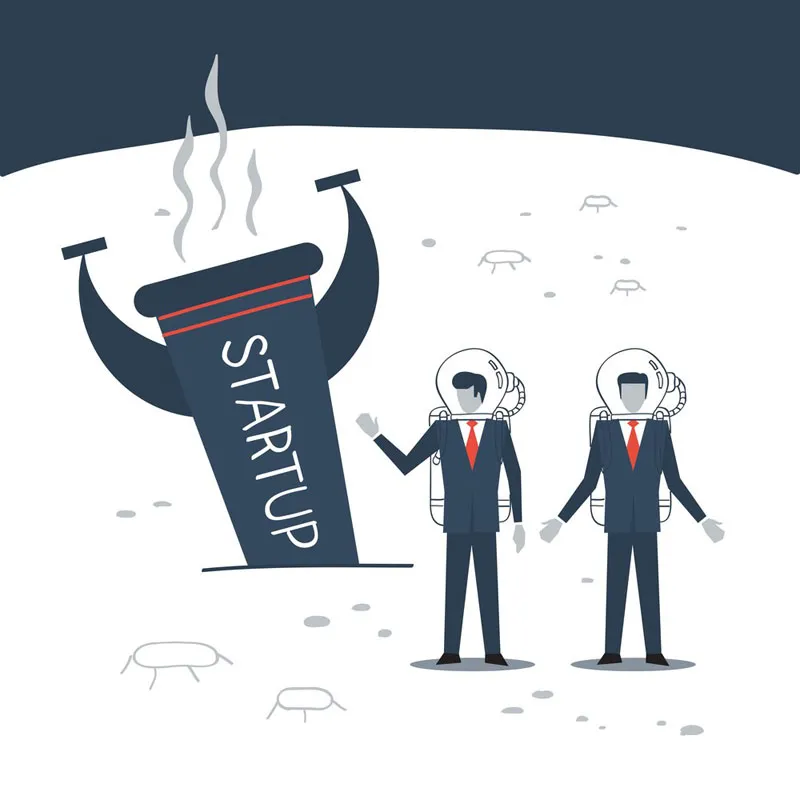How my first startup ended in a loss of Rs 15 lakh and shut down in a year
I thought I would make millions through my startup, but I failed miserably. I read shiny stories of Flipkart and Zomato, but nobody told me that 90 per cent of startups fail within two years.
Mine failed in the first year.
Sometimes, I feel cheated but also acknowledge the fault was mine. I had believed only one side of the story. Today, I am going to tell you the other side of the story.
It was April 2013 when I started getting uncomfortable at my workplace. Thoughts of leaving the boring job were taking over and I was losing interest in my work. I had just returned from the US, and I asked my manager for some time in the pretext of setting up my home in India again. Truth be told, however, my real problem was unhappiness from my job.

We wanted to solve problems related to schools, as we thought education is a billion-dollar industry. We thought we could build any product for schools and make big profits. After long discussions, we came up with the idea of ERP for schools; online software to manage everything from fees and inventory to communication with parents.
I was confident that we could easily hire people. We had everything going to build a good team: an office, money in bank account, hiring policy and most importantly a co-founder with recruitment experience of more than ten years. We met a few people we were interested in hiring. But, to our surprise, not one person wanted to join our startup!
My co-founder remarked,
I could have hired ten people for any other company by this time, I am not sure why people are not joining us.
Since we were from the corporate background, we spent few days on drafting new hiring policy. We introduced company incentives based on revenue and individual performance bonus along with basic salary.
We moved to our new office. We hired a fresher and after a lot of struggle we found someone who impressed us with his technical capabilities but we were doubtful of his managerial and leadership skills. He was a costly hire. We offered him salary plus company incentives if we made any revenue by the end of the year. We were feeling lucky with two developers. I architect the product and developers started coding without waiting for the front-end design.

It was an exciting time. Our product was taking shape. We managed to hire a designer but we compromised a lot with his skillset and attitude. We started feeling the heat of startup hiring. We wanted to complete the product as soon as possible so that we could start selling.
Then we started facing unexpected problems. Our junior developer was not performing up to our expectations so we had to ask him to leave. With a team of just four people, we completed the first version of our product.
We were confident that our product will sell like hot cakes once it will hit the market. We included all the features of top ERP products in the market to beat the competitors. However, we were not happy with the front end design and were continuously looking for a better designer.
Our first potential client (a known school principal) appreciated our idea and demo but put us on hold till she could hear from higher management. We sent her the sales material and thought we will deploy software in a few months.
By this time (six months) the cost of product development was:
Company incorporation: Rs 30,000
Office renovation: Rs 120,000
AC/fridge/inverter: Rs 40,000
Rent: Rs 91,000
Salaries: Rs 3,60,000 + Rs 1,00,000 + Rs 65,000
Travel, food, marketing material and others: Rs 1,00,000
—————-
Total: Rs 9,56,000
—————-
We decided to move our development office to Chandigarh where I would manage operations and my co-founder would handle sales by staying at Gurgaon.
This helped us.
- Now our senior developer was spending more time in development rather than travelling between Gurgaon and Chandigarh.
- We saved money on office rental.
- I saved money on my living expenses
Then came a blow. Our designer scooted with the laptop.
We tracked him and recovered the laptop, but lost our only designer. I took the challenge and learnt the basics of web designing. We revamped the entire design in one month. The product came out nicely.
We started reaching out to schools but neither of us co-founders came from a sales background.
- We struggled to get appointments
- We contacted 10-12 schools without any results
- Crossing the gatekeeper was a big hurdle
- We found out that principals did not have decision power
- The decision makers were never available in the school
- Most schools admins do not check/respond to emails
- Nothing happens for two to three months when selling to schools
We hired a person from Ahmedabad for sales training, but we were unable to sell our product even with more features and less cost, compared to competitors.

We found a few customers by leveraging references, but revenue was far away. My co-founder who took care of the sales said that some big schools wanted to buy our product if we could implement few more features.
I had a different opinion. I argued that we had enough features for any school to get started and there was something missing in the sales process. I thought we should focus on small to medium schools even if we earn less money. Conflict between us started arising.
We started running out of money, so we invested more into our startup. We hired a sales person from a big competitor. We felt we'd found the silver bullet because he gave us access to our competitor's product and told us the secrets of doing sales to schools. He worked with us for a month but could not crack even a single sale. His impressive sales record with the competition was due to the brand name.
We needed more money to survive.
My co-founder was busy chasing big schools that can pay good money in advance. He also started establishing contacts with political and influential people to win deals.
I started reading startup blogs and books and believed in lean startup methodologies and doing more with less resources. Unfortunately, my co-founder was still building our startup like a big corporate.
I proposed to reduce our expenses.
- Bring our only developer from cash to equity (up to 20%).
- Stop chasing big schools and focus on small schools (to reduce sales conversion time).
- Target schools on city outskirts as they will be relatively easy to win over.
- Fire the sales guy and spend all our time in sales.
But our vision was not aligned. At last, my co-founder took over the company and promised to return my cash if the company made any profits in the future.
Expenses till the end (11 months)
Initial six months: Rs 9,56,000
Salaries: Rs 3,00,000
Sales training: Rs 30,000
Rent: Rs 56,000
Travel, marketing and others: Rs 200,000
———————
Total: Rs 15,42,000
———————
By now we had wasted more than Rs 15,00,000 on a product that nobody wanted to purchase. We had only two paying customers, few on trial and a lot in the sales funnel. After a few more weeks of struggle, my co-founder had to join a job. This was the end for SchoolGennie.

Let me share what I learnt along the way:
Know your customer before building your product
We built our product based on the assumptions and feature lists of our competitors. We should have talked to our customers before building our product.
Know where to spend money and where to avoid
We spent most of the money on office infrastructure and employee salaries. We could have avoided 80% of expenses by working from home and hiring employees on survival salary + ESOPs.
We were avoiding expenses on the professional design of sales material, marketing tools, and paid consultancy. We should have spent money on the things that translate into more sales or leads.
- If the primary source of your customer acquisition is your website then you should spend money on content marketing, sales deck, and sales pages.
- If you acquire your customers offline then spend money on sales brochures and other printed material.
Get your hands dirty with the code
Non-technical co-founders remain clueless of technical know-hows.
I advise you to start coding even if you are non-technical. There might be some exceptions but generally a non-tech co-founder can take better decisions if he knew how things get implemented.
Joel, co-founder of Buffer shares why non-tech co-founders must learn coding.
Do sales, even if you are from a non-sales background
I was afraid of doing sales because I thought my co-founder is better at communication and public speaking. We were unable to close sales despite his good communication and HR background. The main reason was that we were not talking about the pain points of the customer but just trying to hard sell our product.
The sales process is not just about good public speaking but addressing the concerns of the customer.
Disclaimer: I am not suggesting that all co-founders should be doing all the things at all the time. They should be owners of their areas but at the same time they should have first-hand experience of all kind of jobs in a startup.
Take decision and trust your intuition
We started postponing tough decisions like spending budget of sales, hiring or firing an employee, offering equity to the employees, chasing big schools or small schools, offering a free solution or charge premium, and at last how to go our separate ways.
Since the closure of my first venture, I started taking firm decisions based on the available information at that time. You can never have 100% data available for taking any decision. You should be smart enough to derive a conclusion with 60-70% information and fill the gap with your intuition.
Don’t stop learning
Alarm bells ring for a startup when someone starts behaving like an expert and refuses to learn new things. You are doomed to fail if you stop learning.
Money is just a by-product of a startup
I learned it very late, but some of you may have realised this by now. We entrepreneurs start a venture to solve a customer’s problem or to explore our passion, and money is just fuel for our startup vehicle. If you focus on money, you would become short-sighted.
Focus on solving problems and keep your customers happy. The money will follow.
Be generous
The most important lesson from my entrepreneurial journey – be generous, be polite, be a giver.
Conclusion
This was the story of my first startup, but I feel most first-time entrepreneurs are on a similar path. I joined another startup as co-founder and it changed my life in a positive way. Now I am working with startups to help them unlock growth.
Originally published at StartupKarma







